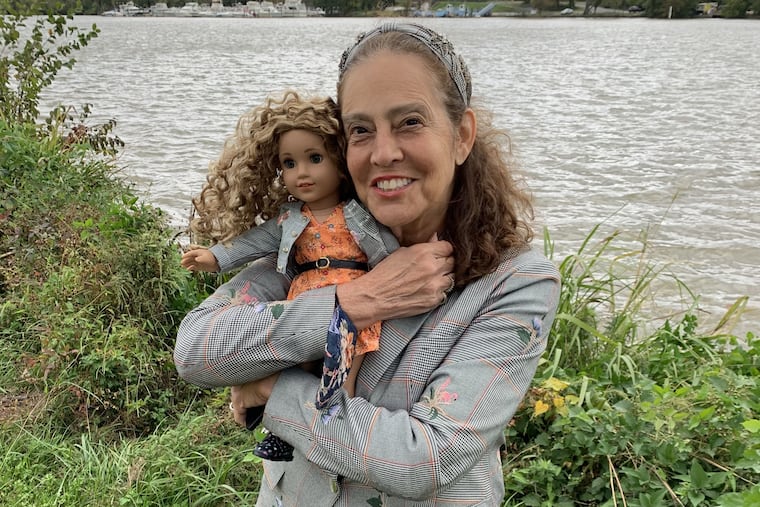A new environmentalist for the next generation is a doll. And she’s from D.C.
The American Girl doll's persona and story were created by two real-life Washington women who have deep emotional and personal ties to the Washington that the rest of the world rarely hears about.

There’s a new environmentalist in town, and she could become bigger than Greta Thunberg with America’s little girls.
She’s a D.C.-based American Girl doll. And she’s making history.
Even I — a mother of boys uninterested in dolls, who went “whew” every time one of her mom friends booked a pricey party at the American Girl Cafe or scrambled to get one of the exclusive editions — am excited about this doll.
This doll is not a lobbyist, a senator or a suffragist — roles to be expected in the popular toy line that teaches women’s history and accomplishments with elaborate backstories and books to make the (expensive) doll thing more palatable.
First of all, Evette is biracial, one of the first in the American Girl universe (they had a special, one-year-only Irish-Japanese doll in 2006) and one of few biracial dolls on the market.
“My three little girls are also biracial,” wrote a mom with the screen name Fiorette on the American Girl website in a review. " ... so I’m the most excited to share Evette and her story with them.”
But what makes Evette historic today is that she’s an environmentalist — changing the script on how the nation’s capital is traditionally represented. She’s really into rivers, the Anacostia River in particular.
And her persona and story were created by two real-life Washington women who have deep emotional and personal ties to the Washington that the rest of the world rarely hears about.
It’s a delightful story.
And it really began back in 1949, when Washington’s African Americans were booed and harassed out of the city’s newly desegregated swimming pools. And many folks just went back to swimming in the river.
“The river was always a welcoming place for us,” said Sharon Dennis Wyeth, 73, remembering the fishing, swimming and picnicking at the Anacostia River that were part of her family’s lore and her own childhood memories.
When she didn’t feel welcome at the city’s lunch counters, she remembered her family retreating to the Anacostia’s shores to relax and recreate. Her grandfather fished. They took family photos. She saw the river most days when she was at Anacostia High School.
And after she graduated in 1966 and went on to Harvard University and a career as a prolific author of children’s books, she left the river behind in her childhood memories.
She lives in New Jersey now and got an interesting assignment: American Girl wanted her to write one of the stories for a line of three new dolls, all based in D.C.
And that immediately brought Wyeth back to the shores of the Anacostia.
“I have never written about an environmental theme, but as I was narrowing the theme down, I instantly thought of the Anacostia River. It was such a positive part of my childhood,” she said.
But then she caught up with the long struggle over pollution and conservation of her beloved river.
“I never thought of the river as needing anything at all,” Wyeth said. “The river was like a grown-up — always there. It took care of you.”
And the story flowed. The girl, Evette Peeters, would be a symbol of the changing city, the daughter of a White man and a Black woman. The family’s cultural conflicts are part of the book, “The River and Me.” And, as she works to unify her divided family, Evette becomes part of the generation that will help care for the river.
The doll is part of the World By Us collection, which includes Makena, an African American doll whose story is about racial justice, and Maritza, who is Bolivian Mexican American and whose story is about immigration. None of the other writers, though, are from D.C.
Wyeth used her own childhood in D.C., the stories of her parents and grandparents to unfold the history of the river and what it meant to Black Washington. But she needed an expert on the river.
That’s how she met Katrina Lashley, who is pretty close to being a real-life Evette. Lashley, 43, works at the Smithsonian’s Anacostia Community Museum and helped create the fascinating Urban Waterways exhibit on the relationship between city people and their rivers.
She grew up in Barbados — where she had two American Girl dolls, Molly and Samantha — and took for granted her access and relationship to water.
“I could hear the sea from my grandmother’s place,” she said, a touch of the Caribbean still in her voice.
When she came to D.C. as a graduate student, she was surprised at how the relationship between the city and its river had diminished. For her, access to a clean and healthy waterway is a human right.
“It’s about quality of life and our right to live a life of dignity and health,” Lashley said.
Every person — no matter their race, class, ability or ethnicity — should be able to easily get to the shore of a river, pond, lake or ocean and exhale, she said. And as she looked at concrete cities, closed parks and increasingly indoor lives, she saw that access was shrinking in America.
So it made perfect sense to work with Wyeth to give American girls the idea that her childhood — where she could go to a clean waterfront every day — is normal. And they deserve that, too.
“I want to make a change in the larger world, to change how people think about the environment,” she said. “I see myself as the doll itself, being very informed about this community ... learning how you can make a difference.”
Petula Dvorak is a columnist for the Washington Post.